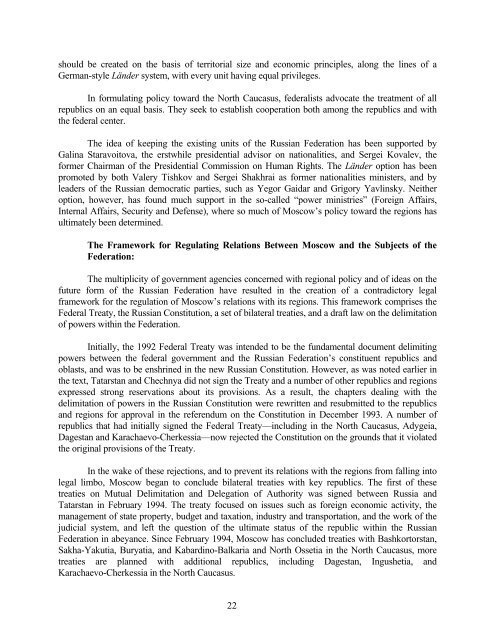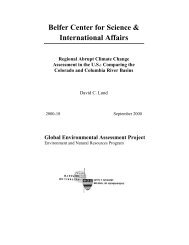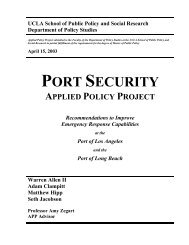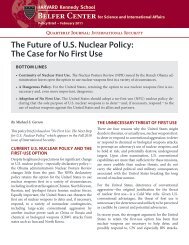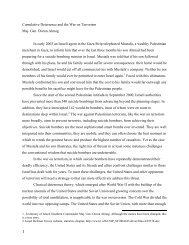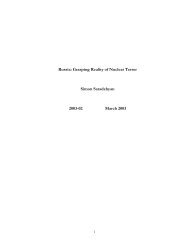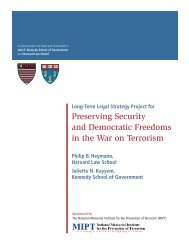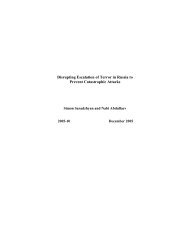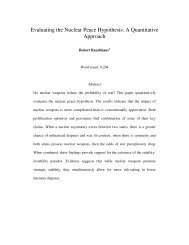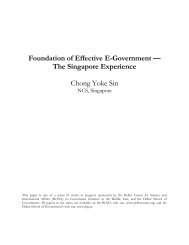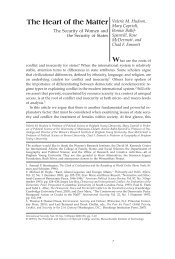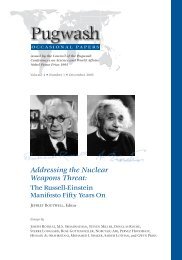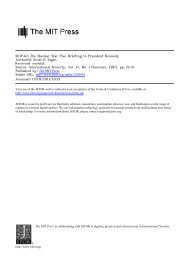RUSSIA'S TINDERBOX - Belfer Center for Science and International ...
RUSSIA'S TINDERBOX - Belfer Center for Science and International ...
RUSSIA'S TINDERBOX - Belfer Center for Science and International ...
Create successful ePaper yourself
Turn your PDF publications into a flip-book with our unique Google optimized e-Paper software.
should be created on the basis of territorial size <strong>and</strong> economic principles, along the lines of a<br />
German-style Länder system, with every unit having equal privileges.<br />
In <strong>for</strong>mulating policy toward the North Caucasus, federalists advocate the treatment of all<br />
republics on an equal basis. They seek to establish cooperation both among the republics <strong>and</strong> with<br />
the federal center.<br />
The idea of keeping the existing units of the Russian Federation has been supported by<br />
Galina Staravoitova, the erstwhile presidential advisor on nationalities, <strong>and</strong> Sergei Kovalev, the<br />
<strong>for</strong>mer Chairman of the Presidential Commission on Human Rights. The Länder option has been<br />
promoted by both Valery Tishkov <strong>and</strong> Sergei Shakhrai as <strong>for</strong>mer nationalities ministers, <strong>and</strong> by<br />
leaders of the Russian democratic parties, such as Yegor Gaidar <strong>and</strong> Grigory Yavlinsky. Neither<br />
option, however, has found much support in the so-called “power ministries” (Foreign Affairs,<br />
Internal Affairs, Security <strong>and</strong> Defense), where so much of Moscow’s policy toward the regions has<br />
ultimately been determined.<br />
The Framework <strong>for</strong> Regulating Relations Between Moscow <strong>and</strong> the Subjects of the<br />
Federation:<br />
The multiplicity of government agencies concerned with regional policy <strong>and</strong> of ideas on the<br />
future <strong>for</strong>m of the Russian Federation have resulted in the creation of a contradictory legal<br />
framework <strong>for</strong> the regulation of Moscow’s relations with its regions. This framework comprises the<br />
Federal Treaty, the Russian Constitution, a set of bilateral treaties, <strong>and</strong> a draft law on the delimitation<br />
of powers within the Federation.<br />
Initially, the 1992 Federal Treaty was intended to be the fundamental document delimiting<br />
powers between the federal government <strong>and</strong> the Russian Federation’s constituent republics <strong>and</strong><br />
oblasts, <strong>and</strong> was to be enshrined in the new Russian Constitution. However, as was noted earlier in<br />
the text, Tatarstan <strong>and</strong> Chechnya did not sign the Treaty <strong>and</strong> a number of other republics <strong>and</strong> regions<br />
expressed strong reservations about its provisions. As a result, the chapters dealing with the<br />
delimitation of powers in the Russian Constitution were rewritten <strong>and</strong> resubmitted to the republics<br />
<strong>and</strong> regions <strong>for</strong> approval in the referendum on the Constitution in December 1993. A number of<br />
republics that had initially signed the Federal Treaty––including in the North Caucasus, Adygeia,<br />
Dagestan <strong>and</strong> Karachaevo-Cherkessia––now rejected the Constitution on the grounds that it violated<br />
the original provisions of the Treaty.<br />
In the wake of these rejections, <strong>and</strong> to prevent its relations with the regions from falling into<br />
legal limbo, Moscow began to conclude bilateral treaties with key republics. The first of these<br />
treaties on Mutual Delimitation <strong>and</strong> Delegation of Authority was signed between Russia <strong>and</strong><br />
Tatarstan in February 1994. The treaty focused on issues such as <strong>for</strong>eign economic activity, the<br />
management of state property, budget <strong>and</strong> taxation, industry <strong>and</strong> transportation, <strong>and</strong> the work of the<br />
judicial system, <strong>and</strong> left the question of the ultimate status of the republic within the Russian<br />
Federation in abeyance. Since February 1994, Moscow has concluded treaties with Bashkortorstan,<br />
Sakha-Yakutia, Buryatia, <strong>and</strong> Kabardino-Balkaria <strong>and</strong> North Ossetia in the North Caucasus, more<br />
treaties are planned with additional republics, including Dagestan, Ingushetia, <strong>and</strong><br />
Karachaevo-Cherkessia in the North Caucasus.<br />
22


